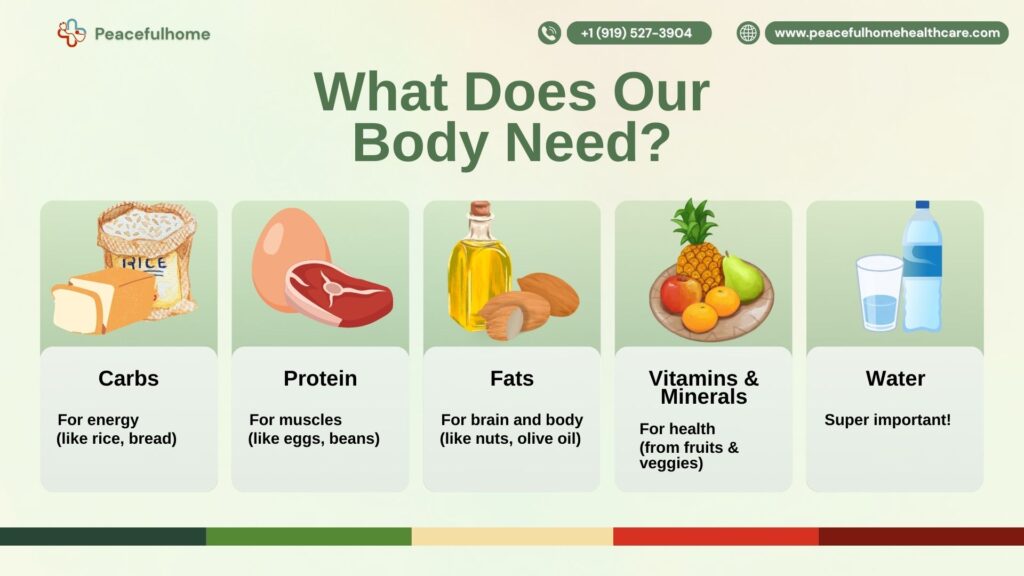Introduction: The Role of Nutrition in Healthy Aging
Aging is an inevitable part of life — but how you age depends largely on the choices you make, especially when it comes to nutrition. The foods you eat can either accelerate or slow down the aging process, influencing everything from your energy levels to your brain function. Understanding nutrition for healthy aging helps you maintain muscle mass, support organ health, and reduce the risk of chronic diseases such as diabetes and heart disease.
Balanced nutrition is not about strict diets or deprivation; it’s about making mindful food choices that nurture your body from the inside out. Whether you’re in your 40s, 60s, or beyond, embracing a nutrient-rich diet can dramatically improve your quality of life.
Understanding the Science Behind Aging and Nutrition
How Aging Affects Nutrient Absorption and Metabolism
As we age, our metabolism naturally slows, and the digestive system becomes less efficient at absorbing key nutrients. The stomach produces less acid, which affects the absorption of vitamin B12, calcium, and iron. This makes it crucial for older adults to consume nutrient-dense foods that provide more vitamins and minerals per calorie.
The Link Between Diet, Longevity, and Cellular Health
Scientific research consistently shows that diet plays a critical role in extending lifespan. Nutrients like antioxidants and omega-3 fatty acids protect cells from oxidative damage, while protein supports tissue repair and regeneration. A diet rich in colorful fruits, vegetables, and lean proteins helps reduce inflammation — a major contributor to aging and disease.

Key Nutrients That Promote Healthy Aging
Protein: Building Blocks for Muscle Maintenance
Muscle mass declines naturally with age, a condition known as sarcopenia. Adequate protein intake helps preserve muscle strength and mobility. Include sources like eggs, fish, lentils, and Greek yogurt in your daily meals.
Omega-3 Fatty Acids: Supporting Brain and Heart Health
Omega-3s found in salmon, chia seeds, and walnuts protect your heart and improve cognitive function. They help reduce inflammation and may even lower the risk of dementia and Alzheimer’s disease.
Antioxidants: Fighting Oxidative Stress and Inflammation
Antioxidants such as vitamin C, vitamin E, and selenium combat free radicals — unstable molecules that damage cells. Berries, dark chocolate, spinach, and green tea are excellent sources.
Calcium and Vitamin D: Strengthening Bones and Joints
Bone density decreases with age, leading to conditions like osteoporosis. Calcium (found in dairy products and leafy greens) and vitamin D (from sunlight and fortified foods) work together to keep bones strong and joints flexible.
B Vitamins: Enhancing Energy and Cognitive Function
B vitamins — especially B6, B12, and folate — are essential for nerve health and energy metabolism. They also reduce homocysteine levels, which are linked to heart disease and cognitive decline.
Best Foods for Healthy Aging
Superfoods That Slow Down Aging Naturally
Superfoods like blueberries, avocados, turmeric, and kale are packed with nutrients that support longevity. These foods are rich in antioxidants, healthy fats, and fiber, helping the body combat inflammation and oxidative stress.
The Role of Whole Grains, Fruits, and Vegetables
Whole grains such as oats, quinoa, and barley stabilize blood sugar levels and promote digestive health. Pairing them with colorful fruits and vegetables ensures a steady supply of vitamins, minerals, and phytochemicals.
Hydration: The Overlooked Key to Youthful Vitality
Even mild dehydration can cause fatigue, dry skin, and joint stiffness. Aim for at least eight glasses of water daily, and include hydrating foods like cucumbers, oranges, and watermelon in your diet.

Dietary Patterns That Support Longevity
The Mediterranean Diet and Its Anti-Aging Benefits
The Mediterranean diet is often considered the gold standard for healthy aging — and for good reason. Rich in fruits, vegetables, whole grains, olive oil, fish, and nuts, this diet provides a balance of healthy fats, lean proteins, and antioxidants. Studies have linked it to a lower risk of cardiovascular disease, improved cognitive function, and longer life expectancy.
Olive oil, a staple of the diet, is packed with monounsaturated fats that reduce inflammation and support heart health. Meanwhile, fish like salmon and sardines deliver essential omega-3 fatty acids that keep your brain sharp.
The DASH Diet: Balancing Heart Health and Blood Pressure
The DASH diet (Dietary Approaches to Stop Hypertension) focuses on limiting sodium intake while emphasizing whole foods such as fruits, vegetables, and low-fat dairy. This approach not only supports heart health but also helps maintain optimal blood pressure and kidney function.
As we age, the risk of hypertension increases, so a diet like DASH can be a powerful tool for keeping your heart young and strong.
Plant-Based Diets and Their Impact on Lifespan
Plant-based diets, including vegetarian and vegan lifestyles, are gaining attention for their anti-aging potential. Rich in fiber, antioxidants, and phytonutrients, these diets reduce inflammation, support healthy gut microbiota, and may even lower cancer risk.
However, those following plant-based diets should ensure adequate intake of vitamin B12, iron, and calcium through fortified foods or supplements.
Nutrition Tips for Different Life Stages
Nutrition for Adults in Their 40s and 50s
During this stage, metabolism begins to slow, and hormonal changes can affect muscle mass and fat distribution. Focus on high-quality protein sources, calcium-rich foods, and healthy fats to maintain muscle strength and bone health.
Limiting added sugars and processed carbohydrates also helps manage blood sugar and cholesterol levels.
Nutrition for Seniors 60+
For seniors, appetite and digestion often decrease, so every calorie must count. Prioritize nutrient-dense foods like eggs, legumes, salmon, leafy greens, and whole grains.
Include soft-textured foods if chewing becomes difficult, and stay hydrated to support digestion and joint function. Nutritional supplements such as vitamin D and B12 can also help fill dietary gaps.
Supplements and When They’re Necessary
While a balanced diet is always the foundation, supplements can be beneficial when deficiencies are present. Common supplements for older adults include vitamin D, calcium, B12, and omega-3s.
However, always consult a healthcare provider before starting any supplement regimen to ensure safety and proper dosage.
Lifestyle Habits That Complement Good Nutrition
The Power of Regular Exercise and Sleep
Nutrition and physical activity go hand in hand. Engaging in at least 150 minutes of moderate exercise weekly improves muscle tone, cardiovascular function, and overall vitality.
Equally important is sleep — during deep sleep, your body repairs cells and tissues. Aim for 7–8 hours of quality rest each night to maximize the benefits of your nutrition plan.
Stress Management and Mindful Eating
Chronic stress accelerates aging by increasing cortisol levels, which can lead to inflammation and poor digestion. Practicing mindfulness, meditation, and yoga can help manage stress.
Mindful eating — paying attention to your hunger cues and savoring each bite — prevents overeating and enhances nutrient absorption.
Common Nutritional Mistakes That Accelerate Aging
Overconsumption of Sugar and Processed Foods
Refined sugars and processed snacks may provide instant gratification but wreak havoc on your cells over time. These foods trigger inflammation, promote insulin resistance, and accelerate the appearance of wrinkles and fatigue.
Opt for natural sweeteners like honey or dates, and choose whole, unprocessed foods whenever possible.
Ignoring Micronutrient Deficiencies
Many people focus on calories rather than nutrients. Deficiencies in vitamins D, B12, and magnesium are common in older adults and can lead to fatigue, bone loss, and cognitive decline.
Regular blood tests and consultations with a dietitian can help identify and address these deficiencies early.
Creating a Personalized Nutrition Plan for Healthy Aging
Consulting a Registered Dietitian or Nutritionist
Everyone’s nutritional needs differ based on genetics, lifestyle, and medical history. Working with a registered dietitian ensures you receive a tailored plan that meets your body’s unique requirements.
They can help you track progress, adjust portion sizes, and recommend supplements as needed.
Tracking Progress and Staying Consistent
Healthy aging is a lifelong journey. Use food journals or apps to monitor your meals, hydration, and activity levels. Consistency — not perfection — is key to seeing lasting results.
FAQs About Nutrition for Healthy Aging
1. What are the top three nutrients for healthy aging?
Protein, omega-3 fatty acids, and antioxidants are crucial for maintaining strength, brain health, and cell protection as you age.
2. Can I reverse aging with nutrition?
While you can’t stop aging, proper nutrition can slow its effects, improve energy levels, and reduce disease risk.
3. How much water should older adults drink daily?
Aim for at least eight 8-ounce glasses of water daily, or more if you’re active or live in a warm climate.
4. Are supplements necessary for everyone over 60?
Not necessarily. Supplements are helpful if your diet lacks certain nutrients, but always check with your doctor before taking any.
5. What’s the best diet for longevity?
The Mediterranean diet has the most evidence supporting its role in promoting longevity and heart health.
6. How can I maintain my appetite as I age?
Eat smaller, frequent meals with high protein and flavor. Staying active and drinking enough water also helps improve appetite.
Conclusion: Nourishing Your Body for a Lifetime of Wellness
Aging gracefully isn’t about fighting time — it’s about working with it. Through smart food choices, hydration, and mindful living, you can nurture your body to thrive at any age.
Nutrition for healthy aging means prioritizing nutrient-rich foods, avoiding processed ingredients, and maintaining a balanced lifestyle that supports your body’s natural rhythm.
Start today by filling your plate with color, staying active, and celebrating each meal as an opportunity to invest in your long-term health.
For additional scientific insights, visit the Harvard Health Blog on Aging and Nutrition.




